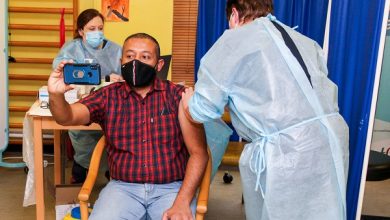‘How to Support New Parents as COVID-19 Restrictions Lift’

We continue our popular weekly HSE series during Covid-19 with the theme: “How to Support New Parents as COVID-19 Restrictions Lift”
The Psychology services for Galway, Mayo and Roscommon have been streamlining some key information for Boyletoday.com viewers each week based on the evidence of what works in similar circumstances. “Our themes will be around building resilience, coping with cocooning, managing relationships, caring for those with disabilities and other vulnerabilities and sharing supports for those who are ill or bereaved”.
———————————————————————————
Expecting a baby can be a very happy time for new parents; however, this transition can equally feel daunting and overwhelming for many. Adjusting to parenthood, no matter how welcome the pregnancy was, has been more challenging for new parents during COVID-19 and all the changes this has brought.
HSE Psychology colleagues (Galway, Mayo, and Roscommon) have put together information to help new parents with what they can expect during these uncertain times, and practical tips on supporting themselves and their babies.
*Whilst this article refers mainly to new mothers, new fathers experience challenges too as they adjust to fatherhood, so the advice is relevant to both.
Common emotions for new mothers in these uncertain times
Having a baby and becoming a parent is a very special and exciting time in your life, filled with many magical moments. The present time is also a particularly challenging time in history, which may affect how you feel about being pregnant, or bringing a new little one into the world. Pregnancy, childbirth, and caring for a new baby can bring dramatic changes to your life, and all of these adjustments can cause you to feel a variety of emotions, especially during a pandemic.
You may feel happy and overjoyed at times, but you may also feel extremely tired, anxious, and overwhelmed, especially during these uncertain times as restrictions lift. It is important to remember that these stress and anxiety responses are normal. Now during COVID times, you may have concerns for what the future holds and concerns for your health or the health of your baby (e.g., “How will I cope?”; “What will I do if the baby or I get sick?”). You are not alone in feeling these feelings. Acknowledge them and try to be gentle with yourself.
You might also be feeling a sense of loss for the birth experience and maternity leave that you had planned for. Many new mothers have described a feeling of grief about how they imagined things would be during this special time. You may be disappointed by cancelled face to face antenatal classes or parent and baby groups, or by being unable to have the family get-togethers or coffee shop meet-ups with other parents. You may feel that you are missing out on, or have missed out on, the birth you had planned for, with less time with your birth partner and no visitors in hospital. To help you cope with these challenges, it is crucial that you check at your antenatal visits what is allowed and what is restricted in your specific maternity department, if you have not yet had your baby.
You may feel isolated as you haven’t had the same contact with family and friends during the lockdown, and now you may wonder what is safe and not safe for you and your baby to do as restrictions lift.
Other new parents have been further challenged by having to look after older children during the closure of schools and childcare settings during the lockdown, which greatly affected the time available to give exclusively to your new baby. Becoming a parent is challenging at the best of times, but even more so now, so you have done amazingly well to get to this point.
Practical coping strategies for new mothers
1) Practice being kind to yourself: All your baby needs is a ‘good enough’ parent who is gentle and kind to themselves, which will help you to tune into your baby’s needs. You may feel guilty if you feel you are not coping with anxious thoughts or the isolation you have felt, or still feel, being away from some of your normal supports. Try to notice any self-critical feelings towards yourself, and bring kindness to your feelings, as they are valid and understandable.
2) Stay connected if possible: While we all need to ensure physical distancing right now, it is really important that now, more than ever, you remain socially and emotionally connected. Build your ‘support village’ and keep in regular contact with those you trust, and by whom you feel genuinely supported, through socially distanced meet-ups, or by phone or video calls.
3) Try to get your basic needs met: It is very important that you eat well and regularly. Enlist the help of family and friends, or organise some batch-cooking to ensure you have something quick and nutritious to hand. Prioritise as much rest as you can, and sleep when the baby sleeps, even if that is in the middle of the day. Avoid using drugs or alcohol to relax. Fresh air and exercise are essential for your emotional well-being and physical recovery. Remember to start exercising very slowly after having a baby and let your body recover.
4) Focus on the positives: You may really have missed sharing the arrival of your new baby with visitors or being able to go out over the past few months. However, ‘cocooning’ with your new baby may have also given you the opportunity to really get to know your baby, and for you to recover physically and emotionally after the pregnancy and birth, and go at your own pace. Getting to know your baby takes time. As you continue to try to tune into their cues and cries, and learn how to respond, it can feel a bit like ‘fumbling in the fog’; but by staying close to your baby, you are giving yourself plenty of opportunity to form a loving, nurturing bond with your little one.
5) Make time for yourself: Remember, you cannot pour from an empty cup. In looking after your baby, you need to care for yourself too. This may be challenging, but doing things that you enjoy to replenish your energy and sense of calmness is important. This might be taking a bubble bath, going for a walk, reading a book, relaxing with a cup of tea or taking a few, deep slow breaths.
6) Seek support when you need it: Be aware of your stress levels and ask for practical and emotional support from family and friends if you feel it is all becoming too much. Others may not know what you need, so try to express this in a way that is clear about what you need and invites a supportive response (e.g., “Can you mind the baby for an hour so I can get some sleep?”).
7) Let go of perfection: Your baby does not need you to be perfect, just ‘good enough’. Let go of having to be in control of everything around you or setting too high a standard. Try not to compare yourself to others or start to believe that other new mums are managing these early days of parenting better. Every new parent struggles and that’s ok.
8) Don’t be afraid to reach out: While you may have been discharged early from hospital, you still might have a lot of recovering to do. It is really important that you know you can contact your GP, Public Health Nurse, or other professional, who will be happy to help you with medical and postnatal care for you and your baby, and information on local supports.
Finally, give yourself the time you need to learn as a new parent and allow yourself to be vulnerable with those you trust. Parenting a new baby is enriching, but it can also be really hard, especially at the moment. Be gentle on yourself and remember that tough times do pass. Minding you and reaching out to others for support will give you and your beautiful new baby the healthiest start together.
Further sources of information / resources:
www.mychild.ie – A HSE website with Information on pregnancy and the first 3 years of your child’s life
HSE book My Pregnancy – Expert advice for every step https://www2.hse.
HSE book My Child: 0-2 years – Expert advice for every step https://www2.hse.ie/wellbeing/
HSE Perinatal Mental Health: The National Programme for Specialist Perinatal Mental Health Services has launched a series of information leaflets to support women and their families experiencing mental health difficulties during pregnancy and in the baby’s first year. To access these resources, as well as a poster on ‘10 things to know about Perinatal Mental Health’ see: www.hse.ie/eng/services/list/
www.tusla.ie/parenting-24-
https://onefamily.ie/– National organisation for one parent families
HSE web page on Ante-natal classes:
World Health Organization – https://www.who.int/news-room/
www.uhgmaternity.com – Provides up to date information for expectant parents on ante-natal classes, labour, post-natal care for Mum and baby etc. as well as factsheets re COVID-19 and pregnancy
www.breastfeeding.ie – HSE webpage with information, advice and support on breastfeeding.





